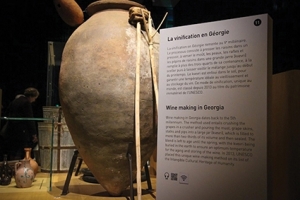Georgian Wine Corner Opens in Marseille National Museum
A Georgian wine corner has been opened in the Museum of European and Mediterranean Civilisations in Marseille, France. The corner will feature as a permanent promotion of Georgian wine to the 20,000 daily museum visitors, alongside a number of traditional items historically used to make Georgian wine.
The opening of the Georgian Wine Corner in the museum was made possible with the cooperation of the national museums of Georgia and Marseille.
“Georgia is on its way to European integration, therefore it’s important to promote Georgia in Europe as a country of ancient civilization, wine culture, history and tradition. This will help to increase awareness of Georgian products in the European market,” Georgia’s Minister of Agriculture, Otar Danelia, stated at the opening ceremony.
Vice Mayor of Marseille, Jean-Francois Soigne, emphasized the importance of representing Georgia in the Museum of European and Mediterranean Civilizations “as an integral part of this civilisation.”
It was noted at the event that Georgia is one of the oldest wine-making centers in the history of Mankind and wine has been made in Georgia for more than 8,000 years. The traditional Georgian Qvevri (clay earthenware vessel) wine-making method was approved by UNESCO in 2013 to be included in the list of Intangible Cultural Heritage.
The Museum of European and Mediterranean Civilisations is devoted to European and Mediterranean civilisations. With a permanent collection charting historical and cultural cross-fertilisation in the Mediterranean basin, it takes an interdisciplinary approach to society through the ages up to modern times.
Presented with the traditional Qvevri wine vessels, on the Georgian stand are various Georgian wine cellar attributes including historical artefacts and important information.
According to the National Statistics Office of Georgia (Geostat), France was one of the top European countries to import Georgian wine in 2015. Georgia exported 37,956 bottles of wine to France, which was 190 percent more than in 2014.
Ana Akhalaia











